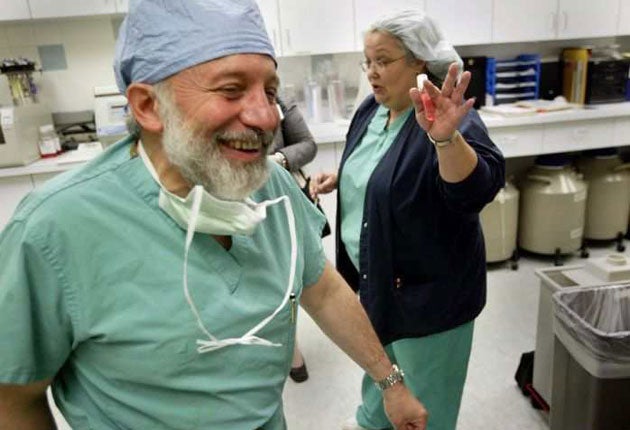Ovary-transplant birth raises fears of ethical dangers
Women can freeze ovaries for later pregnancies, but experts warn of 'societal control' of childbearing age

Your support helps us to tell the story
From reproductive rights to climate change to Big Tech, The Independent is on the ground when the story is developing. Whether it's investigating the financials of Elon Musk's pro-Trump PAC or producing our latest documentary, 'The A Word', which shines a light on the American women fighting for reproductive rights, we know how important it is to parse out the facts from the messaging.
At such a critical moment in US history, we need reporters on the ground. Your donation allows us to keep sending journalists to speak to both sides of the story.
The Independent is trusted by Americans across the entire political spectrum. And unlike many other quality news outlets, we choose not to lock Americans out of our reporting and analysis with paywalls. We believe quality journalism should be available to everyone, paid for by those who can afford it.
Your support makes all the difference.News of the world's first baby born after a remarkable ovary transplant operation offered hope last night to millions of women around the world with fertility problems, including more than 100,000 women in the UK who suffer early menopause and those undergoing chemotherapy or radiotherapy for cancer.
The birth of Maja was described by mother Susanne Butscher as "a little miracle". The 39-year-old was given the ovary by her twin sister, Dorothee, a year ago, after she suffered an early menopause.
Dr Sherman Silber, who carried out the groundbreaking transplant, is based at the Infertility Centre of St Louis, in Missouri, USA. He has pioneered the technique of ovarian tissue transplants in recent years, but the birth of Maja by Caesarean at London's Portland Hospital last Tuesday is the result of the first successful whole ovary transplant.
The news takes us a step closer to seeing the first ever successful womb transplants, according to scientists. Dr Giuseppe Del Priore, vice president of research at of New York Downtown Hospital – who is coordinating an international research programme aimed at making womb transplants a reality – said: "The fact that we can now do this with ovaries takes us closer to seeing the first womb transplant. I think progress is inevitable. I anticipate that there will be a baby born through a uterus transplant sooner rather than later."
But experts last night warned against medical advances being used for the wrong reasons. There are fears that women may view such a transplant as a way of having their ovaries removed and kept in storage so that they can have children later in life.
Mrs Butscher had been diagnosed as being infertile 12 years ago and was told her ovaries were not working properly. The success of the technique will offer hope to infertile women – particularly those with cancer who could otherwise be left infertile by their treatment. They will be able to have their ovaries removed and frozen until they can be put back at a later date. But the overwhelming usage will be by women who want to preserve their fertility for the future and delay the menopause, Dr Silber said.
Nevertheless, Nervi Jokinen, practice and standards development advisor at the Royal College of Midwives, said: "We have an ethical concern about this case. Are the surgeons using science as a tool for societal control of the childbearing age for women?" She added: "The RCM would prefer that surgeons were more committed to using advances in scientific technology to help women who are truly infertile and desperate to conceive."
The British Fertility Society supports ovary transplantation, but only when fertility is at risk because of cancer treatment such as radiotherapy or chemotherapy.
Even the Infertility Network was muted in its response last night. Clare Lewis-Jones, the charity's chief executive, said: "This is potentially good news for patients who cannot produce their own eggs, perhaps through premature menopause or following cancer treatment. Although the technique is still in its very early stages, it does offer hope in the future for some."
Mrs Butscher said giving birth had changed her life: "Being the first woman in the world to give birth after a whole ovary transplant hasn't sunk in yet, but I'm just so grateful to the doctors who enabled this to happen – and to my sister, of course," she said. "I'm so lucky to have had this wonderful opportunity, which has given me a sense of completeness I would never have had otherwise."
Join our commenting forum
Join thought-provoking conversations, follow other Independent readers and see their replies
Comments